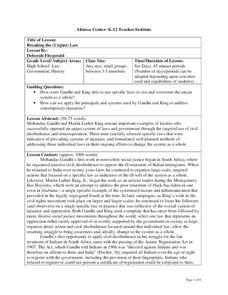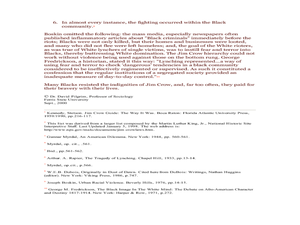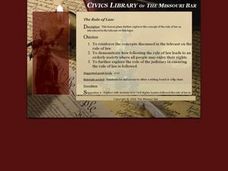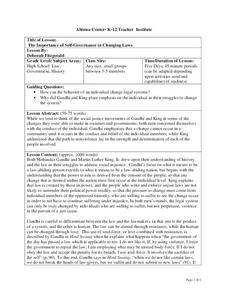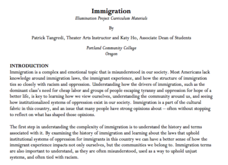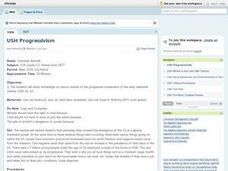Teaching Tolerance
Using Photographs to Teach Social Justice | Confronting Unjust Laws
The right to peacefully assembly to protest injustice is a key element of the First Amendment to the United States Constitution. Class members are asked to analyze two photographs of people confronting what they consider to be unjust...
Curated OER
Breaking the Unjust Law
Students consider the concept of civil disobedience. In this lesson on changing unjust laws, students use primary sources to understand how Gandhi and King changed the law. Students will then list laws that they feel are unjust and plan...
Stockton University Wordpress
Civil Disobedience: Is it ever ok to break the law?
As part of a study of civil disobedience, class members read excerpts from the writings of activists who were willing to break the law to protest unjust laws.
Curated OER
The Rule of Law
High schoolers continue their exploration of the concept of rule of law. As a class, they discuss how Civil Rights leaders followed the rule of law in their protests. After reading various articles, they participate in a discussion and...
Facing History and Ourselves
The Audacity of a Vote: Susan B. Anthony’s Arrest
Susan B. Anthony's speech "Is It a Crime for Women to Vote?" takes center stage in a instructional activity that asks class members to consider how they might respond to what they consider an unjust law. Groups work through the speech...
Wisconsin Historical Society
Civil Disobedience
When is civil disobedience acceptable? Class members read examples of Jim Crow laws, an excerpt from Dr. Martin Luther King's "Letter from a Birmingham Jail," and a newspaper article and then consider the factors that make a law just or...
Curated OER
The Rise and Fall of the Jim Crow Era
Students explore African American history by researching the Jim Crow laws. In this Civil Rights lesson, students define the Jim Crow laws, the reasons they were put into place, and how they were ultimately defeated. Students write a...
Teaching Tolerance
Using Photographs to Teach Social Justice | Confronting Unjust Practices
A powerful photograph of the Freedom Riders of 1961 launches an examination of the de jure and de facto injustices that the civil rights movement of the 1950s and 1960s addressed. Young historians first watch a video and read the Supreme...
Curated OER
Racism, Discrimination, and the Law
Seventh graders examine the various racism and discrimination faced by various ethnic groups in the United States. In groups, they research the legal system and describe the purpose of the United States Constitution. They review cases...
Stanford University
Letter from Birmingham Jail: The Power of Nonviolent Direct Action
What strategies are most effective in changing an unjust law? Class members examine the tactics used in the Birmingham Campaign of 1963 (Project C) to achieve social justice and social transformation. After examining documents that...
Curated OER
Decision Making: Who Was Right?
Help your class explore the question "Is it ever right to disobey a law?" With a strong base of knowledge about the Civil War, anti-slavery movement, and Underground Railroad, your class explores civil disobedience in Marshall, Michigan...
DocsTeach
Oh Freedom! Sought Under the Fugitive Slave Act
Using the harrowing story of the Crafts, a couple enslaved in the South who escaped to freedom, young historians trace the story of the Fugitive Slave Act. After examining documents, including affidavits and arrest warrants for the...
Curated OER
Seeking Civil Rights
Students explore the impact of the Plessy v. Ferguson case. In this social justice lesson, students examine the case, Jim Crow laws, and non-violent forms of protest. Students write essays to persuade the government regarding unjust laws.
Penguin Books
A Teacher's Guide to the Signet Classics Edition of Walden and "Civil Disobedience" by Henry David Thoreau
According to Henry David Thoreau, every citizen must object to unjust laws. The teacher's guide to Thoreau's "Civil Disobedience" begins with a detailed essay synopsis to help readers understand Thoreau's rationale in the challenging...
Curated OER
Impact of Indian Removal
Seventh graders consider how the majority sometimes enforces unjust laws upon the minority. In this Indian Removal lesson, 7th graders research Internet and print sources regarding the Indian Removal Act of 1830 and discuss its impact on...
Stanford University
Lesson Plan: Montgomery Bus Boycott
Most of us have heard of Rosa Parks, the Montgomery Bus Boycott, and Martin Luther King, Jr. But what about Claudette Colvin, Virginia Durr, Freedom Summer, or the Birmingham Children's Crusade? A five-lesson unit prompts class members...
Curated OER
Civics: The Rule of Law
Students examine key concepts pertaining to the rule of law. They explore how Civil Rights leaders such as Martin Luther King, Jr. used it to oppose discrimination practices. They examine Supreme Court decisions demonstrating the...
Curated OER
Latin Roots cern, jur, leg: Advanced Vocabulary Quiz
A bank of 12 words derived from Latin roots cern, jur/jus, and leg scaffolds this exercise for learners who situate the words in challenging sentences. Makes a nice cross-curricular supplement to social studies and law. Quiz results can...
Curated OER
The Importance of Self-Governance in Changing Laws
High schoolers examine the teachings of Gandhi and King. In this nonviolent resistance instructional activity, students listen to a lecture that reveals how Gandhi and King educated their followers about nonviolent resistance. High...
Curated OER
Well, Well, Well
Learners consider a case of potential water contamination by using a process of reasoned discourse about the definition of the problem, the relevant information, and the values behind different solutions. They consider the role of...
Curated OER
Immigration Illumination Project Curriculum Materials
Gain an understanding of the complex topic of immigration with a collection of resources. Class members engage in a series of activities designed to give them insight into the factors that influence immigration policies and the effects...
Curated OER
USH Progressivism
Eleventh graders explore, analyze and interpret various strands of the progressive movements of the early twentieth century. They cover the background of child labor laws, Susan B. Anthony's 1873 court speech and alcohol issues in the...
Planet e-Book
The Great Gatsby
The Great Gatsby has become one of the most iconic novels in American literature. An eBook allows readers to access the full text of the novel by F. Scott Fitzgerald. With the original words and paragraph breaks intact, new generations...
Newseum
Making a Change: Letter From Birmingham Jail
Martin Luther King Jr.'s "Letter From Birmingham Jail" was written in response to "A Call for Unity," written by eight white ministers from Birmingham and published in the local newspaper. After reading both letters and following a list...



